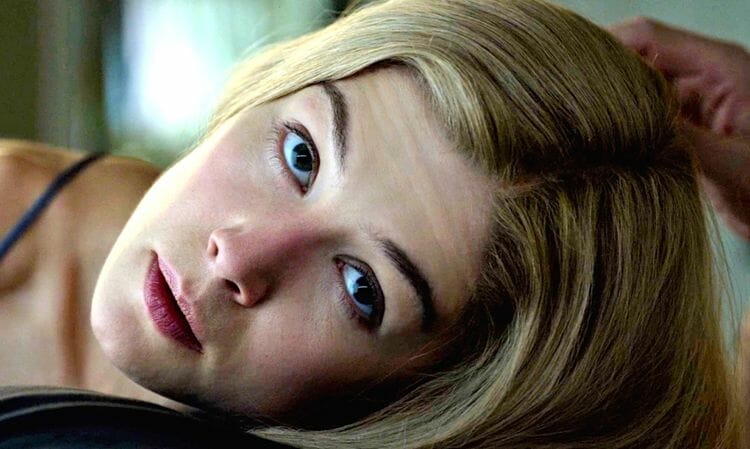By Jim Rohner · October 6, 2014

"All we ever did was resent each other and argue."
"That's marriage."
In a film filled with subjective flashbacks and half-truths focusing on an alleged murder cloaked in mystery involving characters embodying cynicism, it's difficult to pinpoint one specific moment that so completely captures the voice of the filmmakers. Yet that exchange, just one of many jaded exchanges taking place during the disintegrating marriage of Nick (Ben Affleck) and Amy Dunne (Rosamund Pike), is perhaps the one that best typifies the attitudes that director David Fincher and writer/novelist Gillian Flynn imagine their alleged murderer and alleged victim to have towards themselves and their lives together.
But it's not the institution of marriage that's on trial in Gone Girl, rather those individuals that, like the media circus and 3rd party narratives that sculpt their own narrative of Amy's disappearance and Nick's having had a hand in it, believe the illusions that they have created for themselves and for others in adhering to a tainted fiction.
When Amy Dunne goes missing on the morning of July 5th, no one would blame Detective Rhonda Boney (Kim Dickens) for suspecting Amy's husband of five years. Logic would dictate, as Officer Jim Gilpin (Patrick Fugit) suggests, that the easiest answer is often the simplest. But what we know of Nick Dunne – former NYC magazine writer and current world weary bar owner forced to return to his hometown of North Carthage, Missouri as a victim of the recession – while unflattering, doesn't exactly add up to murderer.
Or does it?
What we know of Nick is divulged to us through two separate narratives, with what he tells the authorities (and, by association, us) about himself on and after July 5th lacking, at best, and the hindsight journal entries of Amy beginning from their first meeting seemingly contradicting it all. Amy remembers a time when Nick was funny, cool, carefree, but the one who enters The Bar (how meta) on the "morning of" is quiet and aloof, dragging a clear psychological weight. Amy recalls a time where they vowed to never be like their friends, the "dancing monkeys" who adhere to every cliche about boring, template couples, but in relocating to a nondescript small town huddled deep within a flyover state, they've no choice to become anything else.
"What are you thinking?" These are Nick's thoughts as Gone Girl opens, his wife's head on his chest, her eyes gazing at him with something undetectable just below the surface. The same question could be asked of Nick, whose story doesn't seem to add up until certain revelations late in the film. Even with the mystery being solved, Nick's guilt or innocence in the eyes of the law doesn't absolve his guilt of deception, both of the self and of others. Rather, the genius of Gone Girl is that as the narrative becomes clearer, so does the focus on the emotional themes, the horrifying revelation that the roles our characters have chosen to play and the illusions they've come to believe about themselves and others have sprouted into an inescapable and pervasive cynicism.
The two narratives of Nick paint his as two entirely different people, signifying that despite who he actually is, he's opted to play the part of a man that we've seen countless times before: the cool guy, the man's man, the husband. Punch and Judy puppets make an appearance in Gone Girl and their presence serves as not only a clue for Detective Boney but for the audience as well. Nick and Amy, despite what they've sworn in the past have become puppets, dancing monkeys, but not because their marriage to each other has made them as such. They always were dancing monkeys – or, at least, they always wanted each other to be so whether aware of it or not – and their coming together could only have served to propel them forward into darkness. The dances they perform are not for me to say nor for the trailers to reveal, but as the film progresses, it becomes clear that the declaration of "That's marriage" is not a worldview on the sacrament, but on the commitment to playing a part.
The darkness and cynicism of the tale of Nick and Amy Dunne was not one that needed to be added by David Fincher – it having always existed in Flynn's novel – but what the man who brought us Fight Club and Se7en brings to the thriller is the ability to both recognize and depict it, with his signature frigid fluidity mimicking both the tone and pace of procedurals. Even when flashing back to the good times, the score, again provided by Trent Rezor and Atticus Ross, evokes a sentiment that seems almost too sincere, as though Angelo Badalamenti's score for Twin Peaks had been stuck on repeat during writing sessions. Jeff Cronenweth's cinematography, which always teased of darkness even during the light, sets the mood fantastically from beginning to end, ensuring that at all points and every fantastic bit of casting falls under the shadow that Flynn and Fincher have crafted for us, a shadow of the characters' own making and perpetuation.